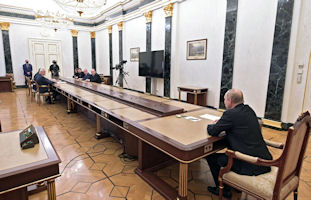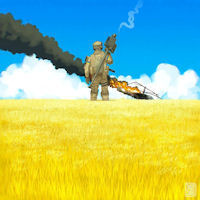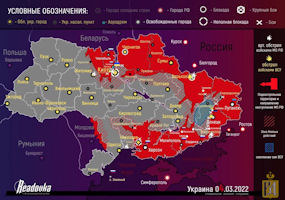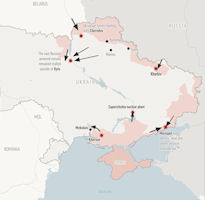Russo-Ukraine War - 05 March 2022
| Su | M | Tu | W | Th | F | Sa |
|---|---|---|---|---|---|---|
| 1 | 2 | 3 | 4 | 5 | ||
| 6 | 7 | 8 | 9 | 10 | 11 | 12 |
| 13 | 14 | 15 | 16 | 17 | 18 | 19 |
| 20 | 21 | 22 | 23 | 24 | 25 | 26 |
| 27 | 28 | 29 | 30 | 31 |
All maps are lies, and by early March there were significant discrepancies in depictions of Russian advances into Ukraine. Some cartographers depicted Russian forces stalled a few hundred kilometers from the Ukrainian border. Other map makers depicted the Russians making significant advances, and by 05 March 2022 being well along the way of encircling the Ukrainian forces arrayed against the separatist forces in the Donbass.
On 24 February 2022, Ukraine was suddenly and deliberately attacked by land, naval and air forces of Russia, igniting the largest European war since the Great Patriotic War. The military buildup in preceeding months makes it obvious that the unprovoked and dastardly Russian attack was deliberately planned long in advance. During the intervening time, the Russian government had deliberately sought to deceive the world by false statements and expressions of hope for continued peace. "To initiate a war of aggression... is not only an international crime; it is the supreme international crime differing only from other war crimes in that it contains within itself the accumulated evil of the whole." [Judgment of the International Military Tribunal]
Russian President Vladimir Putin announced a special military operation in Ukraine in response to the appeal of the leaders of the Donbass republics for help. That attack is a blatant violation of the territorial integrity, sovereignty and independence of Ukraine. Putin stressed that Moscow's plans do not include the occupation of Ukrainian territories, the goal is the demilitarization and denazification of the country. As stated in the Russian Defense Ministry, the Russian military does not strike at cities, but disable only the military infrastructure, so nothing threatens the civilian population. The Ministry of Defense of the Russian Federation emphasized that conscripts or cadets do not take part in the special operation of the Russian Federation in Ukraine.
Vladimir Putin said 05 March 2022 that the decision not to limit the special operation in Ukraine only to the territory of the DPR was completely correct. “We could have acted differently. It was possible simply to help the republics of Donbass on the line of contact, at the front, and to reinforce them with our army. But in this case, from the other side - I mean the reckless support of nationalists from the West, nationalists and radicals - from that side there would be endless support with material resources, equipment, and so on. Therefore, our General Staff, the Ministry of Defense chose a different path,” the head of state said. He noted that the destruction of the Ukrainian military infrastructure is almost over. Putin is confident that the RF Armed Forces will solve all the assigned tasks according to the plan.
 Since the Ukraine invasion began, Russian Defence Minister Sergei Shoigu and armed forces Chief of Staff Valery Gerasimov have become central figures in war launched by Vladimir Putin. When Putin is not alone on the screen, they are usually around. Since the beginning of the Ukraine invasion, Shoigou and Gerasimov have become the faces of the war.Putin does not let the members of the Federation Council, his closest representatives and ministers, come close to him. For fear of the coronavirus or an attack, it doesn't matter. He seems afraid to let the most trusted people near him. Putin was losing contact with reality.
Since the Ukraine invasion began, Russian Defence Minister Sergei Shoigu and armed forces Chief of Staff Valery Gerasimov have become central figures in war launched by Vladimir Putin. When Putin is not alone on the screen, they are usually around. Since the beginning of the Ukraine invasion, Shoigou and Gerasimov have become the faces of the war.Putin does not let the members of the Federation Council, his closest representatives and ministers, come close to him. For fear of the coronavirus or an attack, it doesn't matter. He seems afraid to let the most trusted people near him. Putin was losing contact with reality.
Putin's former speechwriter Abbas Gallyamov spoke to WION as he attempted to decode him. Gallyamov deemed Putin as a "rational" man. "He was always struck me as being absolutely rational. You could never think that he could ever be able to act so emotionally," Abbas said. Gallyamov said that in this case, Putin does have a "plan B". "In this case, he was deceived..he was deceived by his own propaganda. He was trying to prove to Russians that Ukraine is weak and the Russian army is most powerful in the world." Putin did not so much convince Russians, as he convinced himself. "As he crossed the border, he started the action actually hoping that it would be something like it was in 2014 when he took over Crimea from Ukraine."
Russia is all set to intensify its military aggression in Ukraine, US and Nato officials who have been monitoring the war have warned. As per a report, the officials have said that Russia is ready to 'bombard cities into submission.' Speaking to CNN, a senior western intelligence official said, "The heavier weapons are not just heavier in there in the weight, they're also heavier in terms of the damage that they can inflict. And they're far less discriminant. So, more casualties.” Russia will be deploying up to 1,000 more mercenaries to Ukraine in the coming days. This will be done to strengthen the units which have been severely affected in the past few days, states the report.
Moscow was perhaps calculating that missile strikes and a multipronged invasion of ground forces would lead to a swift surrender by the Ukrainian government. The Russians underestimated the will of the Chechens to defend their homeland; similarly, Putin appears to have underestimated the will of Ukrainians to defend their country.
“There are two basic ways you can describe the slowness of the Russian advance in Ukraine,” said Loren Thompson, a defence analyst at the Lexington Institute, a Washington think tank. “One explanation is deliberate restraint. The other explanation is poor execution. We don’t know enough to identify which is the more plausible explanation, but it’s important to recognise the Russians have all sorts of options they have not yet brought to bear,” including heavier use of cyberattacks against the Ukrainian command and control system and air defences.
David Deptula, a retired US Air Force three-star general who once commanded the no-fly zone over northern Iraq, said he was surprised that Russia didn't work harder to establish air dominance from the start. "The Russians are discovering that coordinating multi-domain operations is not easy," Deptula said. "And that they are not as good as they presumed they were."
The Pentagon blasted Russia's seizure of Europe's largest nuclear power plant on March 4, saying the move was 'reckless.' "This underscores the recklessness with which the Russians have been perpetrating this unprovoked invasion and assault on Ukraine and their sovereignty. Attacking a nuclear power plant is exceedingly dangerous and could have visited a lot more damage and destruction to the people of Ukraine and perhaps even to neighboring countries," said Pentagon spokesperson John Kirby.
Ukrainian President Volodymyr Zelensky lashed NATO for ruling out a no-fly zone over his country, saying the Western military alliance knew further Russian aggression was likely. "Today was the NATO summit, a weak summit, a confused summit - a summit that shows that not everyone considers the fight for freedom in Europe to be the number one goal," he said.
Justin Bronk noted "More than a week into the Russian invasion of Ukraine, the Russian Air Force has yet to commence large-scale operations. Inactivity in the first few days could be ascribed to various factors, but the continued absence of major air operations now raises serious capability questions." In war, winning quick control of airspace is crucial. Russia’s failure to do so in Ukraine, despite its vast military strength, has been a surprise and may help explain how Ukraine has so far prevented a rout.
US military officials had assumed that Russia would use its electronic warfare and cyber capabilities to blind and paralyse Ukraine’s air defences and military communications. That would have been "the logical and widely anticipated next step, as seen in almost every military conflict since 1938," wrote the RUSI think-tank in London, in an article called "The Mysterious Case of the Missing Russian Air Force." But the first two weeks have confounded those expectations and instead seen Moscow act far more delicately with its air power, so much so that US officials can't exactly explain what's driving Russia's apparent risk-averse behavior.
Vastly outmatched by Russia's military, in terms of raw numbers and firepower, Ukraine's own air force was still flying and its air defenses are still deemed to be viable, a fact that is baffling military experts. "They're not necessarily willing to take high risks with their own aircraft and their own pilots," a senior US defence official said.
A possible explanation for Russia’s failure to do so is that Putin built his war strategy on an assumption that Ukrainian defenses would easily fold, allowing Russian forces to quickly capture Kyiv, the capital, and crush Ukrainian forces in the east and south without having to achieve air superiority.
Zelensky urged Biden to send American fighter to Poland & other Eastern European nations to enable them to send their Russian-made planes to Ukraine whose pilots are trained to fly Russian aircraft. Any state is entitled in international law to assist another state under attack, on its request, to exercise its UN Article 51 right to self defence. Membership of NATO does not annul that entitlement.
Zelenskiy "made a desperate plea for European countries to provide Russian-made planes to Ukraine" during a video call, US Senate Majority Leader Chuck Schumer said. "These planes are very much needed. And I will do all I can to help the administration to facilitate their transfer," Schumer said in a statement. More than 280 members of the Senate and House of Representatives took part in the call.
NATO's rejection of no-fly zone a 'sign of weakness', says Ukraine foreign minister Dmytro Kuleba. "It's no secret that the highest demand that we have is in fighter jets, attack aircraft, and air-defence systems," Dmytro Kuleba told US Secretary of State Antony Blinken.
 Ukraine complained the newly arrived Panzerfaust anti tank weapons from Germany are rusty and inoperable. Germany pledged it would send Ukraine 2,700 Soviet-era, shoulder-fired Strela missiles. They wanted to deliver 2,700 but as they checked, around 700 were not working, so they deliver the other 2,000 working ones. The Soviet-era missiles were declared obsolete in 2014 and have become corroded in storage. A German lawmaker told DW he was surprised the weapons were still in the country's arsenal. "We are heavily searching now what we can afford to give away, and somebody found them, I was also surprised I did not even know that we have those Strela weapons still in our compartment," said Alexander Müller of the Free Democrats. But the Ukrainian government reportedly specifically requested the missiles despite their age. They are a weapon that many people in the Ukrainian military would have been familiar with over the years, easy to deploy because they are small enough to be carried by people.
Ukraine complained the newly arrived Panzerfaust anti tank weapons from Germany are rusty and inoperable. Germany pledged it would send Ukraine 2,700 Soviet-era, shoulder-fired Strela missiles. They wanted to deliver 2,700 but as they checked, around 700 were not working, so they deliver the other 2,000 working ones. The Soviet-era missiles were declared obsolete in 2014 and have become corroded in storage. A German lawmaker told DW he was surprised the weapons were still in the country's arsenal. "We are heavily searching now what we can afford to give away, and somebody found them, I was also surprised I did not even know that we have those Strela weapons still in our compartment," said Alexander Müller of the Free Democrats. But the Ukrainian government reportedly specifically requested the missiles despite their age. They are a weapon that many people in the Ukrainian military would have been familiar with over the years, easy to deploy because they are small enough to be carried by people.
During the special operation in Ukraine, the Russian Armed Forces hit 2,037 military infrastructure facilities. This was announced on 05 March 2021 by the official representative of the Russian Defense Ministry, Major General Igor Konashenkov. "In total, 2,037 military infrastructure facilities of Ukraine were hit during the operation. Among them were 71 command posts and communication centers of the Ukrainian armed forces; 98 S-300, Buk M-1 and Osa anti-aircraft missile systems, as well as 61 radar station," he said.
According to Konashenkov, 66 aircraft on the ground and 16 aircraft in the air, 708 tanks and other armored combat vehicles, 74 multiple rocket launchers, 261 field artillery and mortars, 505 units of special military vehicles, as well as 56 unmanned aerial vehicles were also destroyed. The military destroyed a large warehouse with Javelin and NLOW anti-tank missile systems in Zhytomyr. As added in the department, the Russian armed forces do not cease to strike at military facilities in Ukraine. DPR troops advanced 27 kilometers overnight. Russian President Vladimir Putin awarded the title of Hero of Russia to Colonel Alexei Bernhard, who served for several years in the 155th Marine Brigade of the Pacific Fleet in Primorye.Putin, at a meeting with permanent members of the Security Council of the Russian Federation, citing examples of the heroism of the Russian military during a special operation in Ukraine, stressed that the soldiers under the command of Colonel Bernhard in the Volnovakha region had broken through the defense in depth, which the nationalists had been strengthening and equipping for almost eight years.
Governor of Primorsky Krai Oleg Kozhemyako wrote about this in his Telegram channel. "Aleksey received the highest military award for skillful actions in the performance of combat missions during a special military operation in eastern Ukraine. His unit successfully broke through the enemy's defenses and put him into a stampede. Alexei went through a glorious path as a marine officer and served for several years in the 155th Marine Brigade of the Pacific Fleet in Vladivostok. He is remembered and appreciated here as a comrade and a competent commander," Kozhemyako wrote.
During the entire, 90 military personnel of the Armed Forces of Ukraine laid down their arms and went over to the side of the DPR. This was announced on March 5 by the press service of the DPR police. Eduard Basurin, an official representative of the DPR militia, said that out of these 90 people, 6 are in the hospital. He turned to the resisting military and said that it was not worth risking your life for the sake of the corrupt Ukrainian government and corrupt generals.
Ukraine put on hold civilian evacuation plans in two besieged cities after reporting firing by Russian troops despite a Moscow claim to have ordered cease-fires around Mariupol and Volnovakha. Russia said it has resumed "offensive actions" after announcing a ceasefire earlier on Saturday in the port towns of Mariupol and neighbouring Volnovakha. "Due to the unwillingness of the Ukrainian side to influence nationalists or extend the regime of silence, offensive actions have been resumed," defence ministry spokesman Igor Konashenkov said.
Near Mariupol, in the Donetsk region, there is the village of Sopino. After the territory of the settlement was taken by the DPR troops, the military discovered laboratories for the production of so-called “combat” drugs for Ukrainian nationalists. This was reported by the correspondent of RIA Novosti from the scene.
Fighters of the “Right Sector” banned in Russia were based in the village. The drug laboratory was located on the territory of the base. “A laboratory for the production of substances near Mariupol, where the Nazis stood. In the neighboring liberated village, exactly the same was found. It’s reluctant to even touch it with your hands: some syringes, flasks, some powders, drugs, here is some kind of a small production complex, ”the correspondent said. According to a DPR soldier, these drugs are “the cause of stupidity, dementia and courage” of Ukrainian nationalists.
As RIA Novosti was informed by local residents of Kharkov, militants of the national battalions who are in the city, “They give the impression of people in a state of drug intoxication, they behave inappropriately and exaltedly, with wild eyes.” Drugs found in the village of Sopino, in particular captogon containing amphetamine, are popular with the terrorists of the Islamic State (IS group, banned in the Russian Federation). They are used to get rid of feelings of fear, and to raise morale.
The military of the Russian Federation seized 4 thousand tons of ammunition of the Armed Forces of Ukraine at the abandoned base of the Armed Forces of Ukraine in the Kherson region. Correspondent of the Izvestia TV channel Maria Badunts. “The servicemen of the Armed Forces of Ukraine abandoned everything: household items, personal belongings, even documentation”.
Russians braced for an uncertain future of spiraling inflation, economic hardship and an even sharper squeeze on imported goods. The rouble lost a third of its value this week after unprecedented Western sanctions were imposed to punish Russia for invading Ukraine. The moves froze much of the central bank's $640 billion in reserves and barred several banks from global payments system SWIFT, leaving the rouble in free-fall.
The US and Russian armed forces have set up a direct phone line to reduce the risks of "miscalculation" amid the war in Ukraine, the Pentagon says. "We think it's valuable to have a direct communication vehicle at that level, at an operational level, to reduce the risks of miscalculation and to be able to communicate in real time if need be," Pentagon spokesperson John Kirby says during a press conference. The "deconfliction line" between US European Command and the Russian Ministry of Defense was established earlier this week, Kirby adds.
The Conflict Intelligence Team (CIT), a Russian-based open-source-monitoring group, estimated Russia's war dead at about 700. "But that doesn't mean the number isn't larger," CIT analyst Ruslan Leviyev told RFE/RL's North Caucasus Service. "It might be 1,000 or even 2,000." Reports of soldiers being killed began slowly accumulating in Russia.
Russia's invasion, which began on Feb. 24, has sent nearly 1.5 million refugees fleeing westward into the European Union and provoked unprecedented international sanctions on Moscow.
|
NEWSLETTER
|
| Join the GlobalSecurity.org mailing list |
|
|
|



